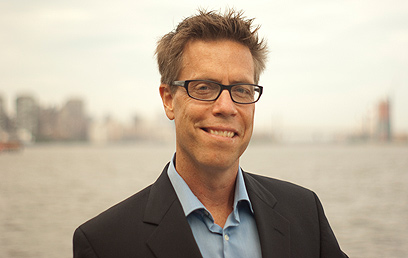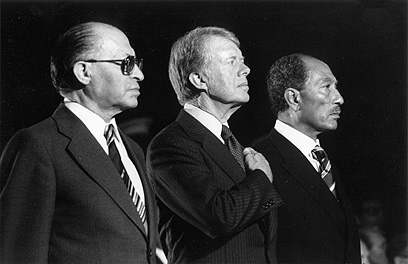
'World depends on Israel-Egypt peace'
(Video) New US documentary film 'Back Door Channels' tells back-story of how Camp David treaty came to be. 'Carter, Begin and Sadat paid a terrible price for peace. No one since, with the exception of Rabin, has dared to push for peace,' director Harry Hunkele tells Ynet
This review is presented as a news report, CNN-style. And so director Harry Hunkele tries to convey a message at the very beginning of the film: The Middle East is important to us all, even today. Neither the region nor its history can be ignored.
From Abraham to Yom Kippur War. 'Back Door Channels' opening scene
Indeed, especially these days, between the recent riots in Egypt and the Palestinian UN statehood bid, the issue of the Israel-Egypt peace treaty as a foundation for Mideast peace resurfaces.
More than 30 years after the Camp David peace treaty was signed, Hunkele returns to the events and people who surrounded the three leaders – US President Jimmy Carter, Egyptian President Anwar Sadat and Israeli Prime Minister Menachem Begin – who brought about this achievement, which he says changed the entire world.
Who's willing to pay the price?
"It’s my great hope that people will view the film and realize that what once happened can happen again," Hunkele says in an interview to Ynet. "All it takes is courageous politicians, but sadly I think that’s the key ingredient missing in today’s world.
"Carter, Begin and, of course, Sadat, paid a terrible price for peace. Politicians take notice of such things and no one since, with the exception of Rabin, has dared to push for peace."
Hunkele was born in Vermont, and embarked on a new career after completing his political science studies - as a director of television documentaries.
He moved to New York City, and was widely recognized for the series "$9.99", "Blueprint: New York City" and "Secrets of New York", which paved the way for new opportunities outside the Big Apple.
Two years ago, after completing a film on Martin Luther King, he embarked on an adventure around the world for the production of "Back Door Channels".
'Back Door Channels' trailer
"We traveled to Israel, Egypt, France, Austria and all over the United States," says Hunkele. "I was continually struck by the fervor that all the interviewees still hold for the issues of the Middle East. It’s been over 30 years, yet for many of them it’s as if their involvement happened yesterday.
"The film focuses on individuals who worked behind the scenes to facilitate the peace process. From National Security Adviser Bill Quandt to American businessman Leon Charney to Israeli general Abraham Tamir to Egyptian diplomat Abdel Raouf el Reedy – the cast of characters involved is truly astounding.
"I was immensely moved to learn how committed people were to peace.The biggest issue in the production of this film was gaining the trust of the participants."
What makes an American guy from Vermont take an interest in the Middle East?
"My passion for this project stems from some very personal connections: I first became aware of the conflict in the Middle East as a12-year-old. My parents were traveling in Europe in 1970 when the Palestinian terrorists hijacked a number of planes.
"My brother, sister and I had been left in the care of an aunt at our home in Vermont and I remember her frantic calls to Europe to check on the safety of my mother and father. They were never in harm’s way, but from that day forward I was a keen observer of the news and especially the news from the Middle East.
"Then in 1979 I was a political science intern in Washington, D.C. and have great memories of the excitement and enthusiasm that surrounded the signing of the Egypt-Israel peace treaty. It was an amazing experience to be in Washington in the spring of '79."

Harry Hunkele. Between New York, Cairo and Jerusalem (Photo: Maria Niro)
Alongside Hunkele's personal connections, he recognizes the fact that the issue is extremely important to the wide American public, justifying the commercial distribution of the film in the country's cinemas.
"The politics of the Middle East have a direct impact on every American," the director explains. "The United States is dependent on Middle Eastern oil. We have been victims of Middle Eastern terrorism. If we ignore the politics of the Middle East, we do so at our own great peril."
But these days the public opinion in Washington is that the US should focus on its internal problems, bring the troops home and stop being the "cop of the world". It's very different from Carter's approach at the time.
"With a strong leader, the United States can push the Middle East peace process forward. Several of the interviewees, notably Carter and Brzezinski, noted that for this to happen President Obama would have needed to start early in his administration.
"It’s my opinion that Obama hasn’t been aggressive enough, and I think the turmoil sweeping though the Arab world is proof of how little influence the United States currently has in the region."

'Back Door Channels' poster
Perhaps your film will put the issue at the top of the American agenda again.
"Our hope in making this film is that people will look back to the 1970s and see that what happened once might possibly happen again – that the achievement of Camp David could ultimately lead to an even greater comprehensive settlement.
"It will take great courage and great compromise on the part of all the parties involved, but I think we have it within our grasp to use the Egypt-Israel peace treaty as the cornerstone for peace."
No leaders for peace deal
Hunkele speaks highly of the leaders who brought about peace with Egypt and expresses his doubts regarding the current ones. He says that almost everyone he spoke to agreed that there is a need for peace but there is no leader around ready to pay the price for an agreement.
"I think what struck me most about the Israelis and Egyptians is how everyone agrees on one thing: The need for a comprehensive solution," says Hunkele, who says unexpected revelations were found about the involved leaders during the research.
"What struck me most about Carter, Begin and Sadat was how deeply religious they were. It’s obvious their faith sustained them during the tough negotiations."

Sadat, Carter and Begin. Deeply religious (Photo: Fisher Klingenstein)
As for the Israeli public, Hunkele reports seeing an apparent disillusionment from the optimistic wave which washed the country after the peace treaty was signed and a disappointment from the cold relations, which have been exchanged with heated tensions recently following Egyptian President Hosni Mubarak's downfall, the anti-Israel protests in Egypt and the attack on the Israeli Embassy in Cairo.
"Everyone I spoke to in Israel recalled the heady days immediately following the signing of the peace treaty," the director says. "I think Israelis were hoping for a normalization of relations. That did not happen and to this day has not happened, and I found there was a tremendous sense of betrayal amongst the Israelis."
Recent events put peace in danger. Where are we headed in your opinion?
"I wish I had a crystal ball and could glimpse the future, because I think the welfare of the world depends on this treaty holding. If Camp David fails, there will be war."
And now, in the wake of the upcoming Palestinian UN statehood declaration, how can Camp David be used to reach stability in the region?
"As President Carter notes in the film, the Egypt-Israel Peace Treaty was to be the 'cornerstone of a comprehensive peace'. My emphasis is on 'cornerstone'. They were preparing to tackle the Palestinian issue. That issue is still with us today and as result we have this matter at the UN.
"I have to wonder what our world would be like today if Carter had won reelection and Sadat had not been assassinated."
- Follow Ynetnews on Facebook










